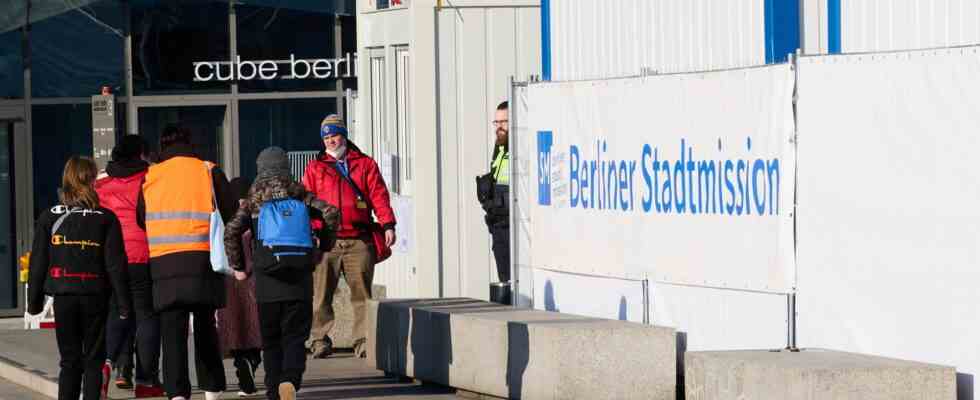FAQ
Status: 03/12/2022 10:47 a.m
Many of the refugees have traumatic experiences behind them. Where can you get psychotherapeutic help in Germany, how are the places ordered – and who will bear the costs?
How many cases are expected?
The estimates of the experts differ, it is difficult to make precise statements. The nationwide Working Group of Psychosocial Centers for Refugees and Torture Victims (BAfF), however, assumes that 30 percent of refugees need psychosocial care. The federal chairman of the German Psychotherapists’ Association (DPtV) Gebhard Hentschel refers to an earlier one Study in a central reception facility in Bavaria. One or more mental diagnoses were found in 63.6 percent of the asylum seekers. A post-traumatic stress disorder was therefore diagnosed most frequently with 32.2 percent.
the National Academy of Sciences Leopoldina writes in a statement on refugees from 2018 that, according to estimates, half of the refugees who have come to Germany in recent years could be mentally burdened by multiple and massive traumatic experiences. “Again, half of these people may not be able to recover unaided,” it said.
Are there enough contact points?
Experts have been complaining about long waiting times and a lack of therapy places for years – especially for refugees. According to the BAfF, almost 12,000 people could not be cared for in the psychosocial centers or placed in other places in 2019. “Germany is not adequately prepared for this situation,” says managing director Lukas Welz. The financing of the psychosocial centers is already precarious.
“Especially in structurally weak and rural regions and the Ruhr area, the capacities are not sufficient,” confirms Hentschel from the DPtV. The corona pandemic has exacerbated this situation. A short-term expansion of the treatment capacities has so far been missed.
Who bears the costs?
War refugees from Ukraine do not have to go through a protection procedure and are given temporary residence status. You receive benefits under the Asylum Seekers Benefits Act. The refugees only have access to basic medical care, for example through health insurance certificates. Applications for therapies are possible. The costs are covered by the social welfare offices. Often, however, they would be given a negative decision, the waiting times are long, criticize experts.
In some federal states there are agreements between the state government and the health insurance companies. There the care is already taken over by the health insurance companies. An electronic health card with a special status identifier is issued for each registered beneficiary, says a spokeswoman for the Ministry of Health.
However, the DPtV criticizes that “the refugees are not immediately issued an insurance card and a regular entitlement to benefits is available in the same way as the statutory health insurance benefits.” Chairman Hentschel calls for a clear signal from politicians to the health insurance companies to provide financial resources for the expansion of treatment capacities. Psychotherapists could be authorized to provide care or receive special needs approvals. In addition, the so-called reimbursement of costs could be expanded. That means: In exceptional cases, patients would be treated in a private practice.
Recently there have been demands that refugees from Ukraine should have access to Hartz IV. In this way, not only would the municipalities be reimbursed for the costs of accommodation, but people would also have the opportunity to receive rapid psychosocial care, said Green migration expert Filiz Polat.
However, one problem remains: Overall, according to experts, the number of approved therapy places remains low, and the waiting times long. A DPtV survey from last yearshowed that 38 percent of all applicants had to wait longer than six months.
What role does a lack of language skills play?
Overcoming language barriers is important in initial care, says trauma expert Ulrike Schmidt. “It is not trivial for a therapist not to understand the patient.”
But even here there seem to be problems. Welz from the BAfF complains that there is often a lack of experience in dealing with the trauma of war and flight and working with translators. He calls for a legal right to translation in the psychosocial care for refugees. In this way, among other things, incorrect treatment due to language barriers could be avoided.
The DPtV points out the lack of interpreters. In addition, the application for the assumption of the costs for the translation during the psychotherapeutic discussions is complex and the approval process is lengthy.
What do the experiences from 2015/2016 teach?
As a result of the experiences from the years 2015/2016, offers were expanded. “There are structures for treating traumatized war refugees that can now be used,” says trauma expert Schmidt. “The high need for support for traumatized survivors of torture and war in 2015 has led to states and municipalities, but above all local initiatives, to create psychosocial centers,” says BAfF manager Welz. “We can build on that.”
According to the DPtV, experience has shown that the psychotherapeutic offer can only be of use to refugees if the municipalities also take on the financing of language and cultural mediators.
How do those affected or helpers find contact persons?
The Federal Center for Health Education has an extensive Overview with contact points created for the health care of refugees.
The internet service Doctor information of the Health Foundation lists doctors in whose practices Ukrainian or Russian is spoken. Among the physicians there are physicians of various disciplines, as well as psychologists and psychotherapists. The directory of doctor information lists around 23,000 entries from practices in which Russian is understood, and in 620 practices patients can communicate in Ukrainian.
The nationwide working group of psychosocial centers for refugees and victims of torture offers an overview and a Map of Germany with the centers.

